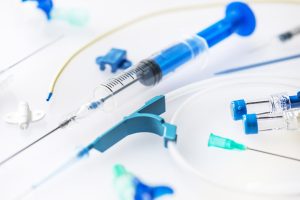Design Verification (DV) Testing Services
Medical device testing for regulatory submission
What is design verification (DV) testing?

DV testing is part of the design and development process used to demonstrate that design outputs match design inputs, and must be considered for all medical devices.
Test methods are typically in accordance with applicable international standards.
However, depending on device classification, and the device’s novelty, intended usage, and risk level, custom-developed test methods may be required.
What is the difference between design verification and design validation?
Design verification testing focuses on the design and development of a medical device and that the device functions as intended and meets its design specifications.
Verification testing is usually performed during the developmental stage of a device and verifies its intended use.
Design validation testing focuses on evaluating the performance and effectiveness of a medical device and demonstrates the product functions as intended and meets the needs of the end user.
This is typically performed after the device is finalized in real-life scenarios to validate the functionality of the medical device.
STERIS offers a wide range of standardized test methods:
- ISO 10555-1 (sterile and single-use catheters)
- ISO 7886-1 (sterile and single-use syringes)
- ISO 11608-1 (needle-based injection systems)
- ISO 11040-4/ISO 11040-5/ISO 11040-6 (pre-filled syringes)
- ISO 20697 (sterile drainage catheters and accessory devices for single use)
- ISO 11070 (sterile single-use intravascular introducers, dilators, and guidewires)
- ISO 9026 (stainless steel needle tubing for the manufacture of medical devise – requirements and test methods)
In addition to offering test methods in line with international standards, STERIS supports Customers with developing custom test methods tailored to meet specific product needs.
Test types include:
- Dimensional analysis
- Simulated use testing
- Mechanical strength
- Deployment/retrieval force
- Trackability testing
- Kink radius evaluations
- Torque strength
- Material and device characterization
- Burst pressure/leak assessments
- Environmental
- Shock
- Vibration
Medical device types include (but are not limited to):
- Catheters
- Delivery systems
- Guidewires
- Auto-injectors
- Pre-filled syringes and needles
- Inhalers
- Insulin pumps
- Blood oxygenators
- Ventilators
- Endoscopes and endoscopic accessories
Technical Support
STERIS also offers technical guidance to support medical device design, including:
- Early-stage design
- Risk assessment
- Identification of applicable test standards
- Test method development
- Protocol development
- TMV (Test Method Validation) and equipment qualification
- Test planning and project management
- Technical file documentation
Related content:
TechTalk: Testing validation TechTalk webinars



